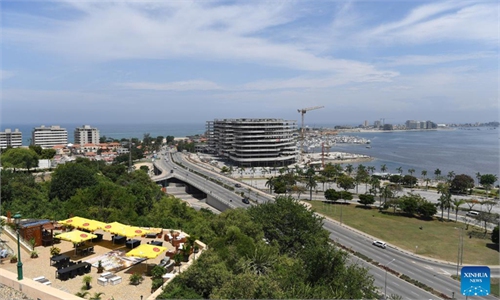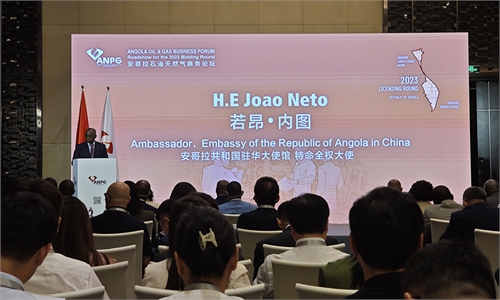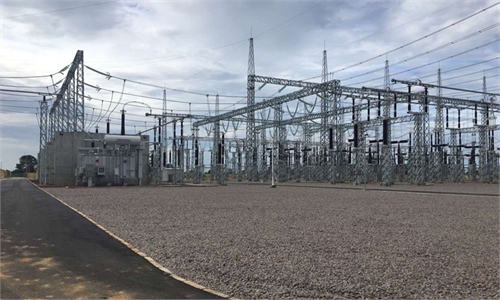China, Angola sign reciprocal investment protection agreement, as economic partnership will be accelerated: Foreign Minister Téte António
Nations ink a reciprocal investment protection agreement to enhance cooperation
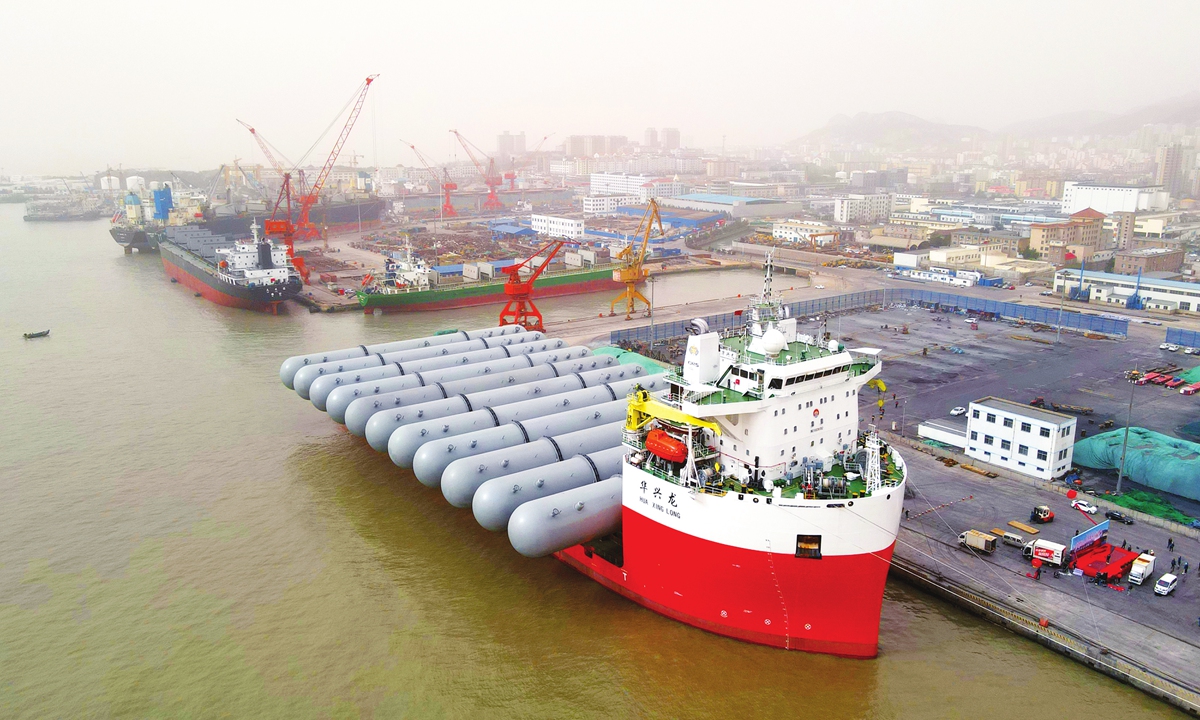
A cargo ship loading super-large petroleum liquefied gas storage tanks manufactured by a Chinese company departs for Angola from Rongcheng, East China's Shandong Province on April 11, 2023. Photo: cnsphoto
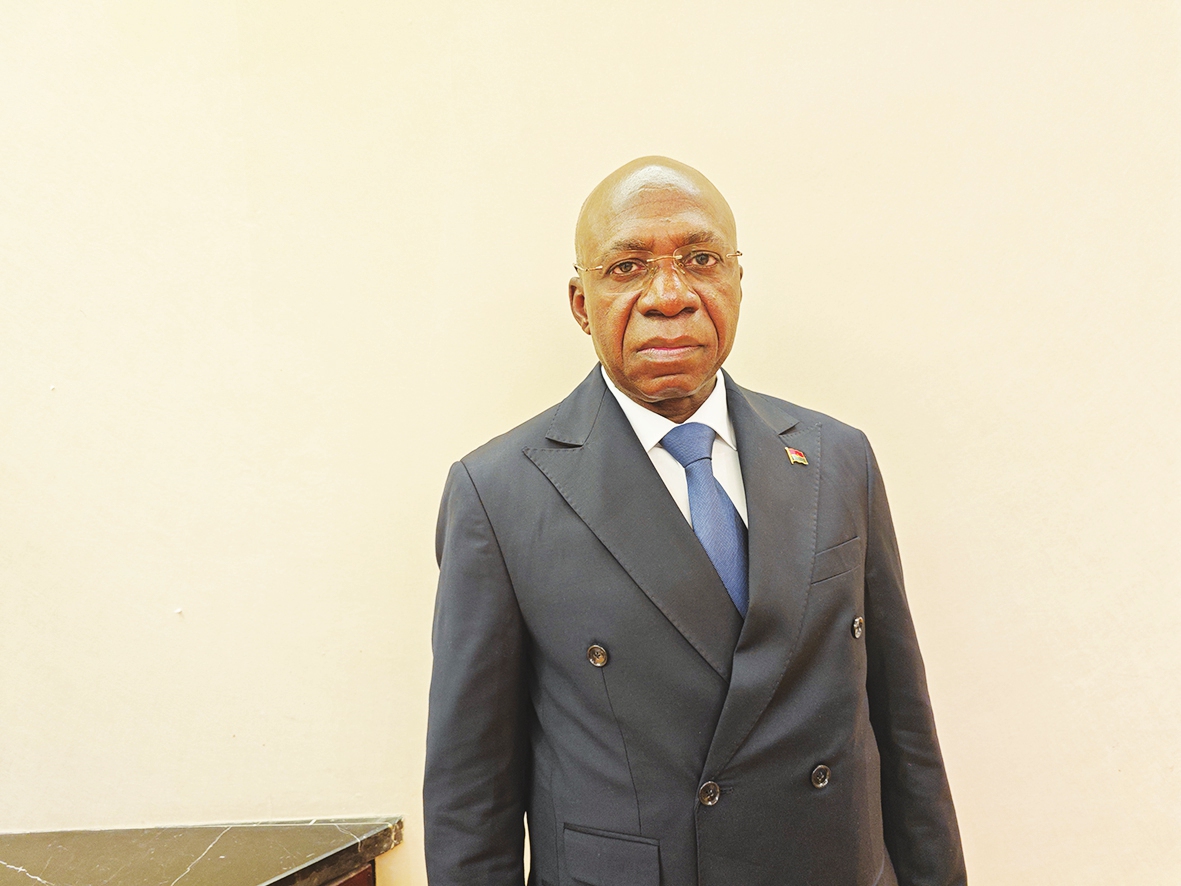
Minister of Foreign Affairs of Angola Téte António Photo: Yin Yeping/GT
Editor's Note:During the past 40 years, China and Angola have nurtured deep trade and economic cooperation, which is win-win. Angola is China's second-largest trading partner in Africa, with China being both a top export destination and import source for Angola. Despite negative portrayals in the Western media, the bilateral relations remain harmonious and strong. The Global Times (GT) reporter Yin Yeping recently interviewed Angolan Foreign Minister Téte António (António) during his visit to China from December 5 to 8, who noted the importance of continuing to improve Angola-China ties.
GT: Can you introduce the goal of your recent visit to China? How many agreements have been reached, and what specific areas do they cover?
António: The purpose of my visit is to strengthen relations between China and Angola. We have signed a reciprocal investment protection agreement, a crucial pact for all economic cooperation, covering various Chinese investments protected within the territory of Angola. This agreement is significant, taking 12 years to finalize, aligning symbolically with our 40th anniversary of diplomatic relations. I carry a message of friendship from President João Lourenço to President Xi Jinping.
The reciprocal investment protection agreement aims to encourage Chinese private investors not only to invest in Angola. Beyond mere encouragement, it serves as a tool to safeguard all investments that China, Chinese citizens, both from the private and public sectors, may undertake in Angola.
GT: Starting from December 25, 98 percent of taxable products from six least-developed African countries including Angola will be exempt from tariffs entering China, following an announcement from Customs Tariff Commission of China's State Council on December 6. How do you see its effect in helping boost Angola's trade with China?
António: Certainly, this constitutes an incentive for the export of Angola to China. However, this incentive must be accompanied, as mentioned earlier, by investment. Let me provide an example. We are coffee producers; in the 1970s, Angola was the world's 4th-largest coffee producer. Currently, our entrepreneurs can offer a substantial amount of coffee, but they lack the capacity to meet the quantities our partners require. Hence, there is a need to encourage investment in the agricultural sector. We appeal to other Chinese entrepreneurs to show interest in these domains, while expressing appreciation for those already collaborating with us.
GT: Which areas do you see a potential for greater cooperation between China and Angola?
António: As we assess the legal agreements already signed and those awaiting finalization, a spectrum of collaborative opportunities emerges. Notably, China has been an important partner in mining, agriculture, and fisheries. There's a pending agreement on agricultural production, with the Angolan side prepared for immediate endorsement, anticipating China's reciprocal commitment. Simultaneously, a ready-to-implement accord is in place for fisheries. Our strategic focus aligns with Angola's objectives, emphasizing critical infrastructure development. Collaborating closely with China, we're engaged in ambitious projects spanning dams, road networks, railways and more. The collective goal is to draw investments into key Angolan sectors, including agriculture, livestock, and mineral production.
Recognizing the imperative to diversify our economy, especially considering our predominant reliance on oil (exceeding 90 percent), we acknowledge the essential role of technology, a skilled workforce, and strategic partnerships. In this context, China stands out as a pivotal and proven partner, poised to contribute significantly to the multifaceted initiatives.
GT: This year marks the 10th anniversary of the Belt and Road Initiative. Angola was one of the earliest participants to BRI. How do you evaluate the achievements under this initiative?
António: I believe this is, as they say in English, a "work in progress." We shouldn't dwell on our current status; instead, we must persist in refining and advancing, taking into account the interests of all parties involved.
GT: China is leading the world in green energy sector development, including electric vehicles, solar panels, wind turbines and more. How do you envision future cooperation in renewables between the two nations?
António: It's fortunate that you asked that question. We believe that, like everyone else, especially countries in this region, Angola possesses significant natural resources. Let's take the example of electric batteries. Approximately 80 percent of cobalt and lithium, crucial components in manufacturing batteries, are found in a country like the Democratic Republic of the Congo. Angola also holds this potential.
The major concern for African countries today is that, despite the current global landscape, we'll continue to export raw materials. Our aspiration is for China to assist us in producing batteries in Africa. This way, we can export value-added products, as centuries of raw material exports haven't brought significant development to the continent. As the battery industry evolves, we'd like the batteries circulating in neighboring countries through the Lobito Corridor railway, to contain not just raw copper but also some semi-finished or finished products. We acknowledge that China's extensive knowledge in this field could help African continent make this collective leap.
We've been actively engaged in renewable energy sources, despite being an oil-producing country. There's substantial investment to be made, particularly in solar energy, primarily in the southern region where we've made substantial commitments.
Regarding nuclear energy, it demands knowledge and advanced technology. I believe that in our friendship with China, we can collaborate in transferring expertise or providing training to master this type of energy. Nuclear-related knowledge isn't only beneficial for energy production; it serves various purposes, including medicine. Our collaboration with the International Atomic Energy Agency in cancer treatment exemplifies this.
GT: Some Western politicians and media smear China's investment in Africa, such as Angola, causes "debt traps", and China "attempts to impose influence" in Africa. What is your take?
António: I believe that any partner, regardless of their origin, viewing Africa in such a way represents a subordination of African individuals and the continent itself.
It suggests an uncomfortable notion that Africans must necessarily be under someone's domination. This perspective leaves us uneasy. What does it imply? We are an open country- Angola is open, Africa is open- and we all have a place for partnerships.
Collaboration is about complementarity that leads to progress. This question was frequently posed to me when I was a representative of the African Union at the United Nations, based in New York, and it often arises in universities due to the significant presence of Chinese individuals in Africa.
My response has always been, "Where were Chinatowns established? Not in Luanda, not in Bamako, not in Addis Ababa, but in major cities like London, Paris, New York, Ottawa." So, what does that signify? It signifies that if cooperation can exist between China and these countries, why can't it also occur with Africa?
I find it troubling if any partner believes that exclusivity should be reserved for Africa. It amounts to the subordination of the African continent, suggesting that Africa, by nature, must be dominated by someone, as it was in the past. Often, these perspectives overlook the sentiments of a people who were once colonized and enslaved. This prolonged view insisting on the necessity of exclusivity and domination is a subordinate outlook, and I don't believe it fosters a friendly attitude, regardless of the source.
